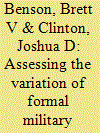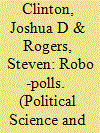| Srl | Item |
| 1 |
ID:
147315


|
|
|
|
|
| Summary/Abstract |
Many critical questions involving the causes and consequences of formal military alliances are related to differences between various alliances in terms of the scope of the formal obligations, the depth of the commitment between signatories, and the potential military capacity of the alliance. Studying the causes and consequences of such variation is difficult because while we possess many indicators of various features of an alliance agreement that are thought to be related to the broader theoretical concepts of interest, it is unclear how to use the multitude of observable measures to characterize these broader underlying concepts. We show how a Bayesian measurement model can be used to provide parsimonious estimates of the scope, depth, and potential military capacity of formal military alliances signed between 1816 and 2000. We use the resulting estimates to explore some core intuitions that were previously difficult to verify regarding the formation of the formal alliance agreement, and we check the validity of the measures against known cases in alliances as well as by exploring common expectations regarding historical alliances.
|
|
|
|
|
|
|
|
|
|
|
|
|
|
|
|
| 2 |
ID:
158493


|
|
|
|
|
| Summary/Abstract |
Whether public policy affects electoral politics is an enduring question with an elusive answer. We identify the impact of the highly contested Patient Protection and Affordable Care Act (ACA) of 2010 by exploiting cross-state variation created by the 2012 Supreme Court decision in National Federation of Independent Business v. Sebelius. We compare changes in registration and turnout following the expansion of Medicaid in January of 2014 to show that counties in expansion states experience higher political participation compared to similar counties in nonexpansion states. Importantly, the increases we identify are concentrated in counties with the largest percentage of eligible beneficiaries. The effect on voter registration persists through the 2016 election, but an impact on voter turnout is only evident in 2014. Despite the partisan politics surrounding the ACA–a political environment that differs markedly from social programs producing policy feedbacks in the past—our evidence is broadly consistent with claims that social policy programs can produce some political impacts, at least in the short-term.
|
|
|
|
|
|
|
|
|
|
|
|
|
|
|
|
| 3 |
ID:
121629


|
|
|
|
|
| Publication |
2013.
|
| Summary/Abstract |
After the 2012 Republican New Hampshire primary, 159 poll results were released prior to the subsequent nomination contests in the Republican presidential primary. More than two-thirds of these polls relied on interactive voice response (IVR) software to conduct the interviews. We evaluate the ability of polls to predict the vote-share for the Republican candidates Romney, Santorum, and Gingrich. We find no overall difference in the average accuracy of IVR and traditional human polls, but IVR polls conducted prior to human polls are significantly poorer predictors of election outcomes than traditional human polls even after controlling for characteristics of the states, polls, and electoral environment. These findings provide suggestive, but not conclusive, evidence that pollsters may take cues from one another given the stakes involved. If so, reported polls should not be assumed to be independent of one another and so-called poll-of-polls will be misleadingly precise.
|
|
|
|
|
|
|
|
|
|
|
|
|
|
|
|